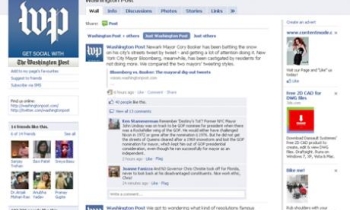The decision by General Electric Co. and Pearson PLC to abandon their efforts to bid for Dow Jones & Co. aids Rupert Murdoch in his quest to acquire the publisher of The Wall Street Journal but raises questions about the strategies of the other three going forward.
Pearson must now determine the best course for its Financial Times newspaper, which the publishing company was considering hiving off into a new group in partnership with GE’s CNBC business-news cable channel. Pearson’s shareholders have long urged the company to sell its FT group — which also includes French and German newspapers and a 50% stake in the Economist magazine — rather than invest more in a division that doesn’t fit well with Pearson’s core educational-publishing ventures.Pearson has stood by the FT in the past: Chief Executive Marjorie Scardino once said the paper would be sold only “over my dead body,” though she has softened that comment since. But now Pearson is in the awkward position of letting the world know that it is ready to offload at least part of the group. Amid consolidation in the media industry, particularly if Mr. Murdoch’s News Corp. buys Dow Jones, Pearson’s FT division could find itself outgunned by larger rivals competing for business readers and advertisers. News Corp. has said it would beef up the Journal’s presence in Europe and Asia. With more media companies using different outlets, from television to the Internet to newspapers, Pearson could find itself with limited access to some platforms.
GE and Pearson are discussing a deal in which the FT could provide content to CNBC’s channels outside the U.S. and to its Web site, according to people close to the matter. CNBC has a similar deal with The Wall Street Journal for its U.S. stations.
The talks over a rival bid for Dow Jones, which is in negotiations with News Corp. over a bid of $60 a share, or $5 billion, foundered because the price was too high, according to people close to the matter. They added that the talks were exploratory only. The plan was to spin off the FT and CNBC into a closely held company that would then buy Dow Jones.
For Dow Jones, the elimination of GE/Pearson as a potential bidder diminishes its leverage in negotiating with Mr. Murdoch. These negotiations had for the past two weeks centered on the Bancroft family, which controls Dow Jones, and its efforts to preserve editorial independence, but on Wednesday the family threw that discussion to the Dow Jones board. This freed the board to begin discussing issues of price with News Corp., which Dow Jones hopes will increase its bid. Yesterday, a board committee was conferring with its advisers over an editorial proposal. The Dow Jones board hopes to get a proposal to News Corp. by Monday, according to people familiar with the discussions.
GE, for its part, faces the prospect of one of its most profitable TV assets, CNBC, being challenged by News Corp.’s Fox Business Channel, which will be launched this fall and could benefit from Dow Jones content. The Wall Street Journal currently provides such content to CNBC under a deal that expires in 2012. People close to CNBC say the Fox start-up doesn’t alarm them too much: It has lined up cable coverage in 30 million households, while CNBC is in 92 million homes. However, Fox News came from nowhere to surpass Time Warner Inc.’s CNN in both viewers and ad dollars.
Recently, CNBC seems to have been testing Financial Times reporters and content, according to a person familiar with the matter. CNBC executives are expecting they will negotiate with Mr. Murdoch in the event of a News Corp. takeover of Dow Jones, using the channel’s existing contract with Dow Jones as leverage, this person said. As News Corp. and GE’s NBC Universal have TV and film assets around the world, there is much potential for horse-trading.
A CNBC spokesman declined to comment.
GE had positioned itself as a wary participant that wanted to see if there was an economic structure that would work. It has said it feels no threat from News Corp.’s proposed business channel and insists its main interest was in Dow Jones’s digital platform, an area where GE is pushing to expand.









